How Muslims are celebrating Ramadan in year two of the pandemic
Sameer Sarmast and his family follow the “fried food diet” during Ramadan, breaking their fast at sunset with pakoras, veggie fritters and keema or minced beef samosas.
For the Bergen County, New Jersey family, the monthlong holiday is a time to disconnect from the daily routine, bond spiritually with Allah, strengthen community relationships and eat good food.
Ramadan, a Muslim holiday that spans the ninth month of the Islamic calendar, runs from April 13 to May 12 this year.
The month is dedicated to worship, charity and community. It welcomes Muslims to retreat from human and worldly desires and focus on renewing their Iman, or faith. Muslims celebrate by abstaining from food, drink and sexual activity from sunrise to sunset, and typically join in communal prayer and post-sunset feasting.
After last year’s Ramadan with its pandemic-altered observances, where mosques were shuttered and community gatherings were eliminated, Muslims this year are planning another holiday of modified celebrations as COVID-19 continues to spread, even as vaccines are distributed.
Back to normal, sort of
Sarmast, who hosts a halal restaurant review show on YouTube called Sameer’s Eats, sees the holiday going back to a semblance of normal with more people receiving vaccines.
“I could see myself getting together with people for iftars (the meal that breaks the fast) at restaurants like we used to,” Sarmast said. “I think I could see myself, along with my parents, back at the mosque for the Taraweeh prayers (additional night prayers).”
His favorite things about the holiday are praying, eating and breaking fast with the community because “Ramadan brings people together," Sarmast said, and pushes Muslims to seek forgiveness and be kinder.
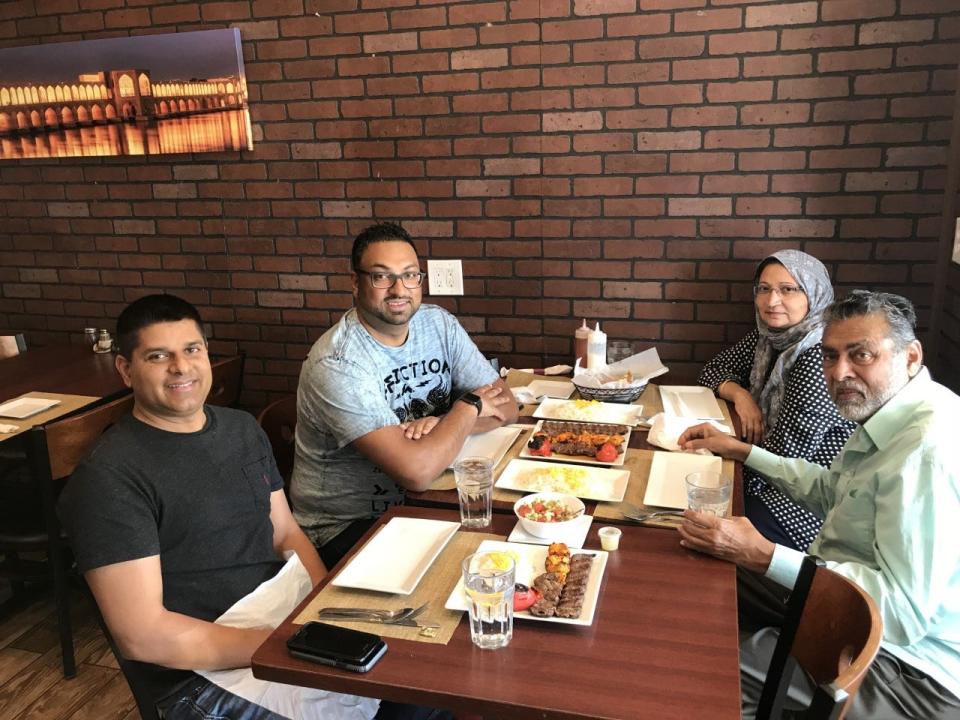
So, he’s looking forward to doing those things again this year, while taking stock of lessons learned from the pandemic.
“I think the pandemic in a sense kind of taught us lessons that Ramadan would also teach because we were restraining ourselves from doing things during the pandemic, like going out, restraining from going to the movies or enjoying normalcy like a form of entertainment,” Sarmast said.
“These are things, even during Ramadan we abstain from … we try to focus more on prayer and spirituality” he observed.
Ramadan for Lamisa Fairooz of Rochester, New York, means cooking with her mom, nightly visits at the mosque and lots of bhoot moori — black peas and puffed rice.
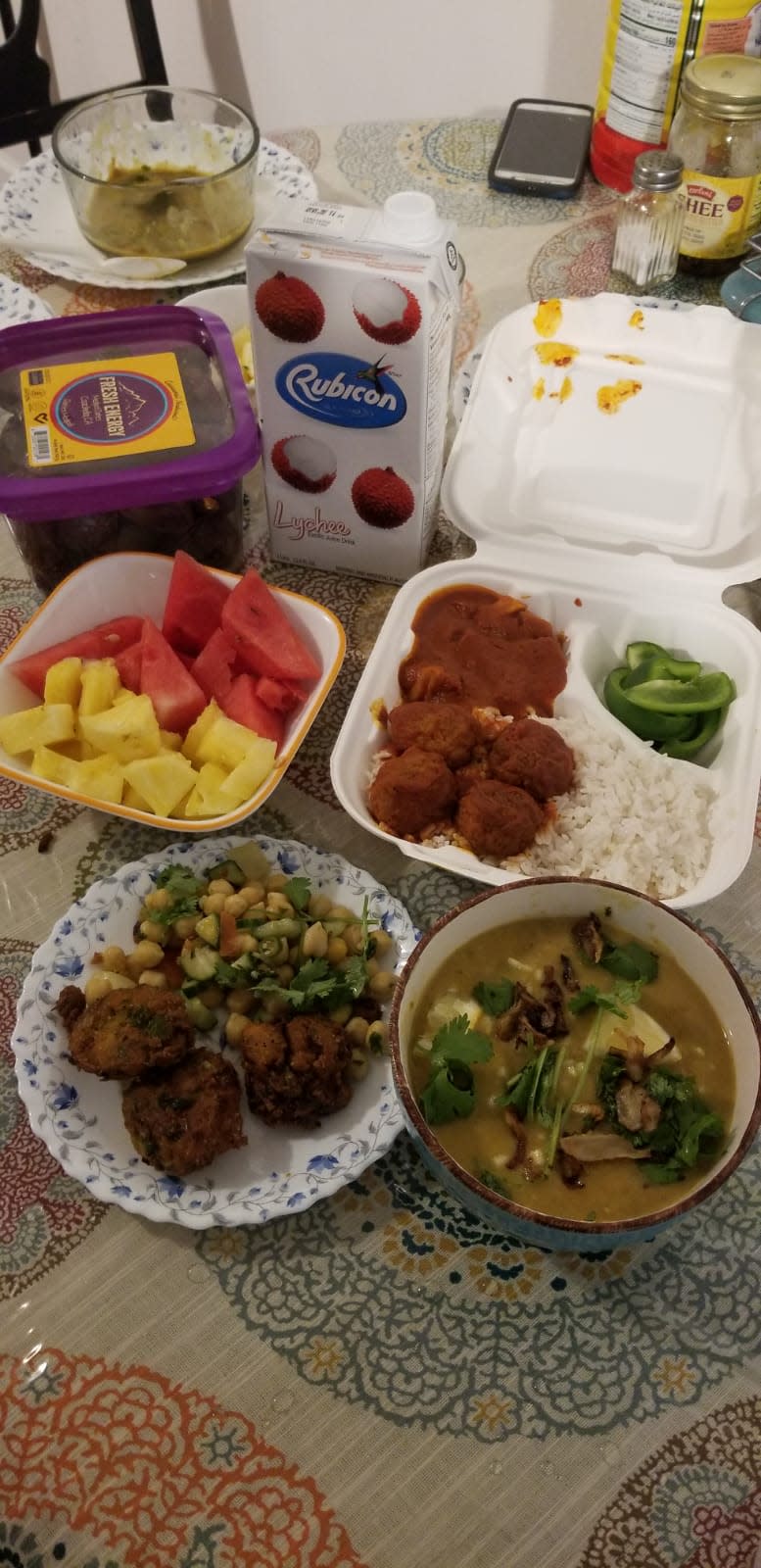
To have some communal engagement last year, she and her family made weekly iftar packages for local college students with the Islamic Center of Rochester. They would spend the day cooking and packaging the meals, and her brother and his friends would drive around the city to deliver them.
The mosque will continue its meal distribution this Ramadan with no-contact drive-up iftars to families in need during the month at the mosque.
Fairooz, a student at Rochester Institute of Technology (RIT), said last year’s modifications showed her family how to celebrate without having to rely on going to public iftars.
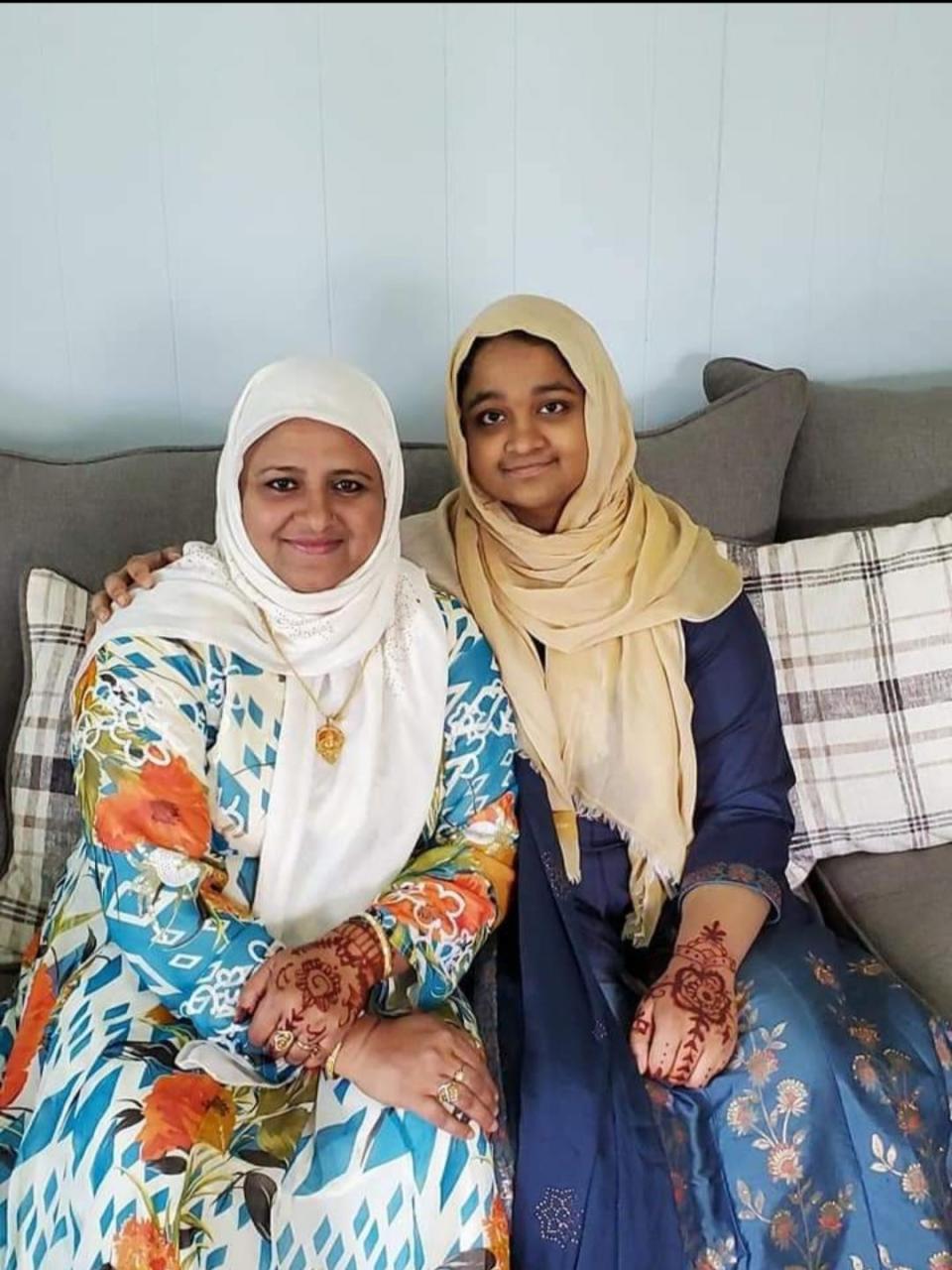
“We get to spend more time with our family,” Fairooz said. “My brother's wife came from Bangladesh a couple of days ago … so this Ramadan, we have a new member in the family, which is going to be really cool.”
Fairooz and her family are open to visiting the mosque once in a while this Ramadan since they received their vaccines. So, she’s looking forward to returning to the place of worship for her favorite part of the holiday, the nightly Taraweeh prayers, and continuing the tradition of cooking with her mom.
For Tahir Qazi, the last 10 nights of the holiday are particularly special as he performs I’tikaaf, the practice of staying in a mosque for a prescribed number of days and devoting oneself to worship.
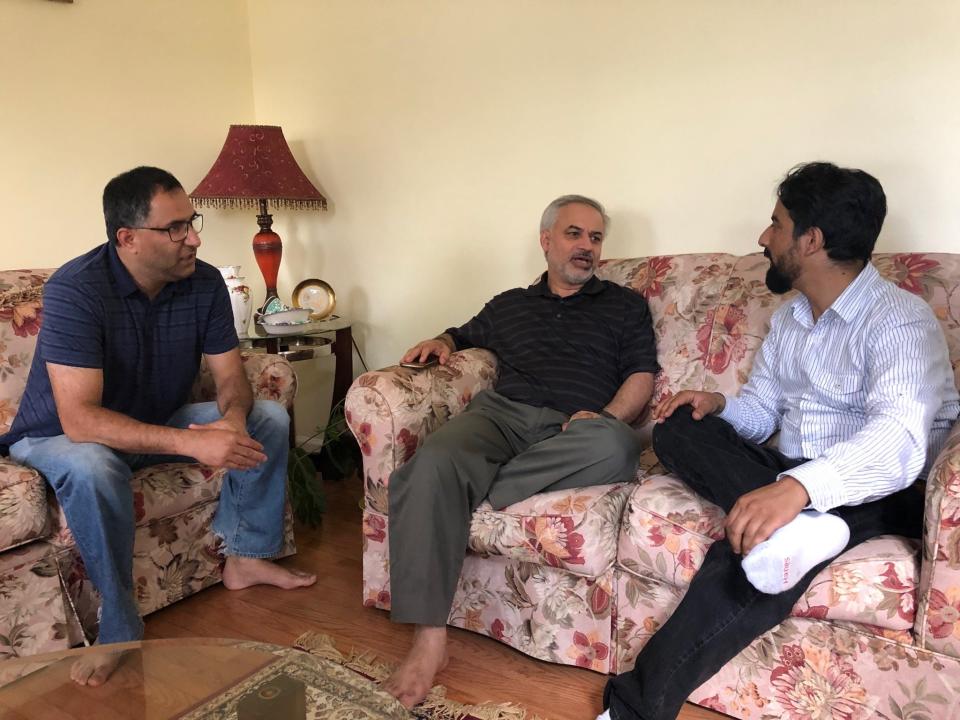
Last year, Qazi and his family adjusted their observances at home with Facebook Live sessions from the local mosque and having iftars together as a family.
Qazi, who lives in Cherry Hill, New Jersey, thinks this year will be different with more people getting vaccinated.
“I'm not sure how it will look like this year,” Qazi said. “We’ve been vaccinated already and so it's quite possible that it might happen that I will stay a few days at the masjid (mosque). We have started meeting with people because they're all vaccinated and we’re all vaccinated, so it’s easier to meet now.”
Baltimore native and resident Zainab Chaudry said the vaccine distribution process has been “convoluted and complicated” in Maryland, so she thinks mosques won’t be offering communal iftars like usual.
“It would be a recipe for disaster, no pun intended, if like everybody came together for an iftar at the mosque, because obviously when you eat, you have to take off the face mask and it’s hard to stay socially or physically distanced,” Chaudry said.
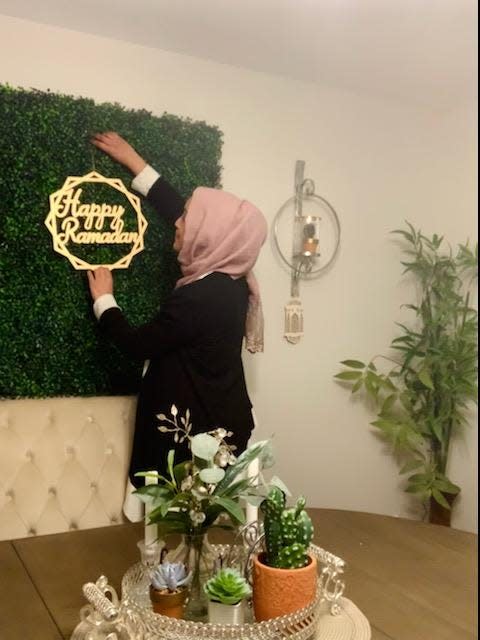
As director of CAIR or the Council on American-Islamic Relations office in Maryland, she knows many mosques will continue pandemic protocols like temperature scanning, requesting members bring their own prayer mats and offering virtual programming to encourage congregations to stay home as much as possible.
Chaudry plans to spend the holiday with family members but still exercise precautions like social distancing and masks because not everyone has been vaccinated.
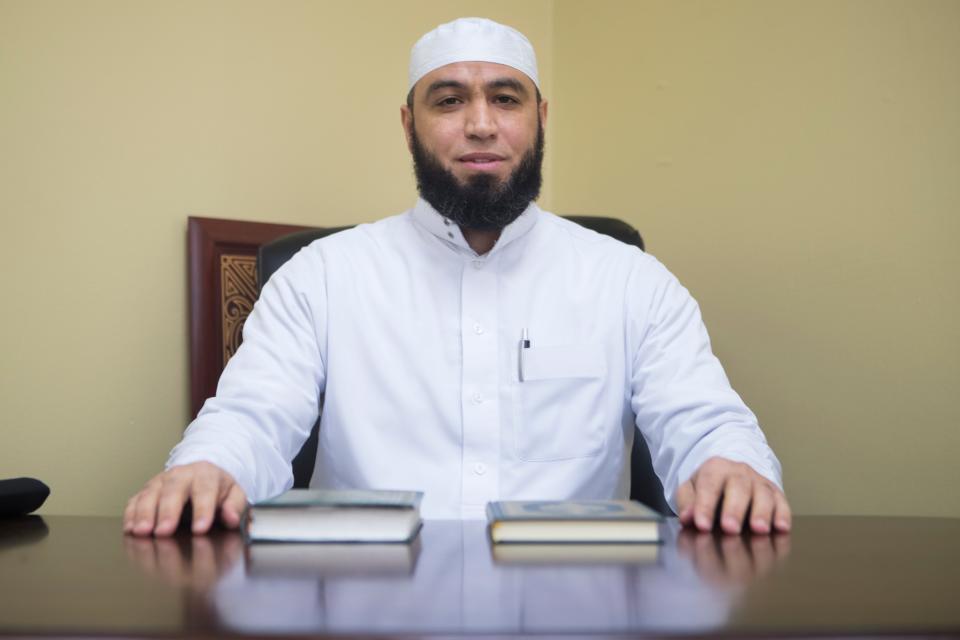
“It's a very special time of year for Muslims, especially when nieces and nephews come over — like they feel it, too,” Chaudry said.
She’ll be continuing her tradition of decorating and eating traditional Pakistani foods such as kebabs, samosas and falooda, a cold milk dessert made of rose syrup, vermicelli and sweet basil seeds.
A smaller congregation
In normal times, the Islamic Society of Delaware, the oldest and largest mosque in the state, Ramadan is packed with 700 to 800 people every night for Taraweeh prayers.
The number was reduced to zero during the pandemic and stayed so long after the 2020 holiday ended. A couple of months ago, the mosque reopened, with 6-foot distance protocols in place.
Imam Hadi Shehata sees some semblance of normal this Ramadan but with the challenge of keeping numbers low since social distancing only leaves space for 120 to 150 people.
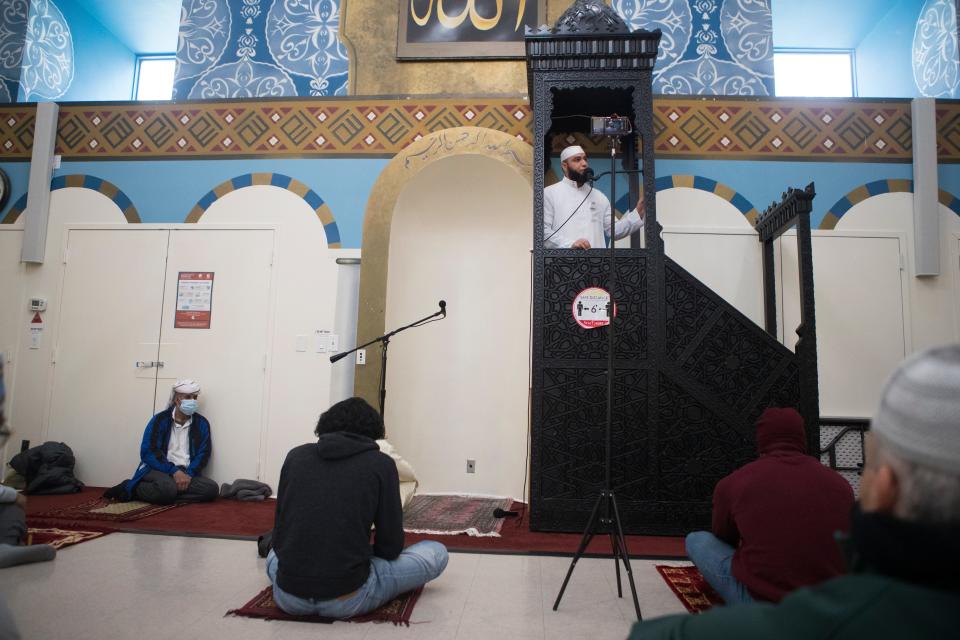
The mosque plans to have tents outside, bringing up the number to 350. They will also cancel iftars — which typically brings in an extra 100 to 120 people on the weekends — and just offer water and dates for members.
“Just for the safety of everyone — we want to make sure that everybody will be safe and secure,” Shehata said.
Ramadan is particularly special for Shehata as he left Egypt 15 years ago to lead prayers during the holiday and ended up staying to serve as the mosque’s imam. He is looking forward to eating his favorite food, biryani (a South Asian mixed rice dish), and seeing the community congregating again, even in smaller numbers.
“It makes me so happy to see new faces (that) are coming to the lecture during the month of Ramadan,” Shehata said. “People come to Taraweeh every single time, and so you feel like (it is) something very unique … in the month of Ramadan when you see that 29 days or 30 days in a row and that definitely the level of Iman (faith) goes so high.”
Pre-pandemic, the Islamic Association of Erie in Pennsylvania would host nightly iftars for single, working professionals and college students, fundraisers for the mosque and weekend communal suhoors — the meal that starts the fast.
It was all canceled last year, but Imam Abdella Elhafiz said this year will be a modified program. There will be takeout available for those professionals and students, limited attendance and socially distanced congregations. Weekend gatherings will remain canceled.
“My personal recommendation — and I said that to my community — that we (are) trying to still not to be complacent because the virus is now mutating in different ways,” Elhafiz said. “So, we'll try to be cautious about the disease. We're really not encouraging people really to come out.”
Elhafiz will miss the communal gatherings where an array of international food from Somalia to Bosnia would be set up.
“The social gatherings, that's (my) favorite thing,” Elhafiz said. “In the regular days, people are so busy … but once Ramadan comes … there's like a bond together, that we don't see it in every month.”
Giving back with food
The virus was a real fear for Mohamed Sadek Goubaa, owner of Don Panchito Halal Mexican Grill in Philadelphia, and with mosques being closed during last year’s Ramadan he needed to secure what he called his spiritual “lifeline.”
So, he and a couple of friends used his event venue above his restaurant as a place to pray Taraweeh prayers.
During that time, the restaurant was slow but still had large amounts of food. Goubaa and his friends delivered free meals to people who'd lost their jobs, the homeless and city service workers. They also gave out free care packages of fruits and produce at his restaurant.
“It’s like a race of whoever can do more khair (to do good), like who can beat us,” Goubaa said. “That's the type of jealousy and khair that the Prophet encouraged: ‘Strive to do khair where you guys can compete against each other.’”
This year, Goubaa is continuing this tradition by collaborating with local mosques and Muslim organizations to provide pre-packaged foods.
At his restaurant, he’ll also host iftar parties — a buffet of rice and beans, bourak (an Algerian egg roll), and foods from other restaurants as well.
Goubaa is excited to dedicate a month to worship and prayer, eat his favorite Algerian foods — bourak and a red lentil soup called chorba — and reconnect with the Muslim community.
“The one thing I love most about Ramadan in the U.S., especially in Philadelphia, is the community that we have,” Goubaa said. “It's not only the sense of ibadah (worship); it's also a sense of community, meeting people that we haven't met in a long time.”
Running a restaurant during Ramadan
Last year’s Ramadan was also quite different for Beth and Mohammad AlFayad, owners of Levantine’s Café and Bakery in Rochester, New York.
Not only was the pandemic in full effect, but it was their first year running their restaurant.
“We've never owned a restaurant during Ramadan and we've never owned a restaurant during Ramadan during a pandemic,” Beth said. “So, what the heck does this look like?”
The couple adapted to fit the new normal. They set up family meals where guests could place an order and have it delivered to their friends for iftar.
They also hosted a few iftar nights for students at the University of Rochester and Rochester Institute of Technology who were studying abroad, couldn’t go home and had relied on campus facilities that were shut down.
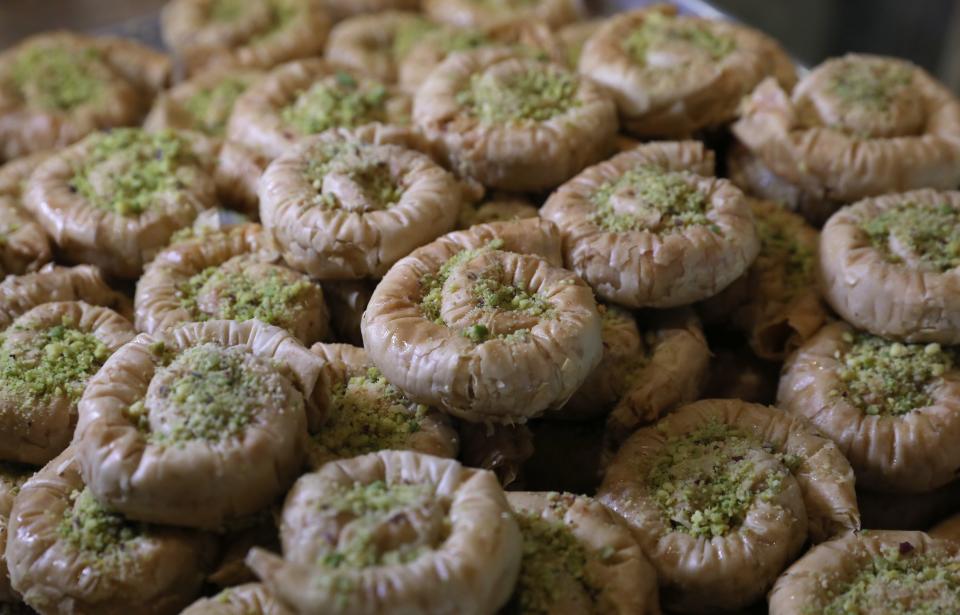
“It was nice because during the day last year we were spending our time feeding people, which is a really beautiful thing that you should do like all year round,” Beth said. “But then it also meant that some of those effects of the pandemic were a little bit lessened for us because we still felt like we were doing something for the community, even though we weren't with the community.”
This year, the couple will continue those traditions since the restaurant is not open for indoor dining yet, to give staff the chance to get fully vaccinated. They anticipate guests wanting to get meals delivered again this holiday season.
For the AlFayads, Ramadan means Mohammad's mother cooking kibbeh, bulgur meat balls and hot yogurt sauce; qamar al-din, an apricot drink, and tamer hindi, a tart juice, throughout the month; and preparing sweets like maamoul, filled semolina butter cookies, to end the holiday.
Taste-testing while fasting
It is hard to fast while cooking for customers, Mohammad AlFayad said, as he works in the kitchen throughout the day checking temperatures and making sure the recipes come out right. When it comes time to sample the dishes for taste, he gets some help.
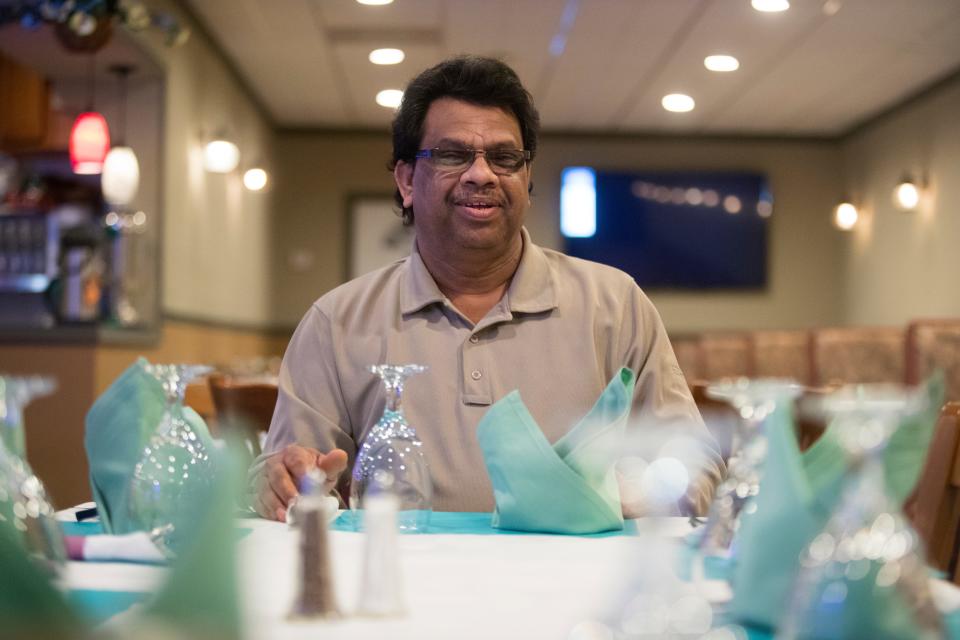
“So, I have cashiers who don't celebrate Ramadan and I use them to taste for me,” Mohammad said.
“We joke and we say like, ‘Hey, Ramadan is coming, come to your shift hungry,’ ” Beth said. “’We're gonna use you to taste everything for us.’”
Mohammed Elias, owner of Indian Grille in Wilmington, Delaware, is used to cooking while fasting. He has a technique for tasting where he dabs a bit on his tongue to taste then wipes it away. If there is any doubt, his sous chef will double-check.
“You can put it on your mouth, but you cannot take (swallow it),” Elias said. “And plus, with the experience, we know how much salt to use. So, no (guest) complaints so far.”
Sohaib Kareem, owner of Shish Kabob in Erie, Pennsylvania, said working in the kitchen while fasting is “exhausting and dehydrating,” but the reward of feeding his guests is far greater.
“I am able to serve many of my customers that are also fasting during the holy month of Ramadan,” Kareem said. “At the end of the day, I am able to meet with my family and break my fast with delicious food that my family and I have prepared.”
This article originally appeared on Bucks County Courier Times: Ramadan 2021: How Muslims are celebrating during COVID-19 pandemic

